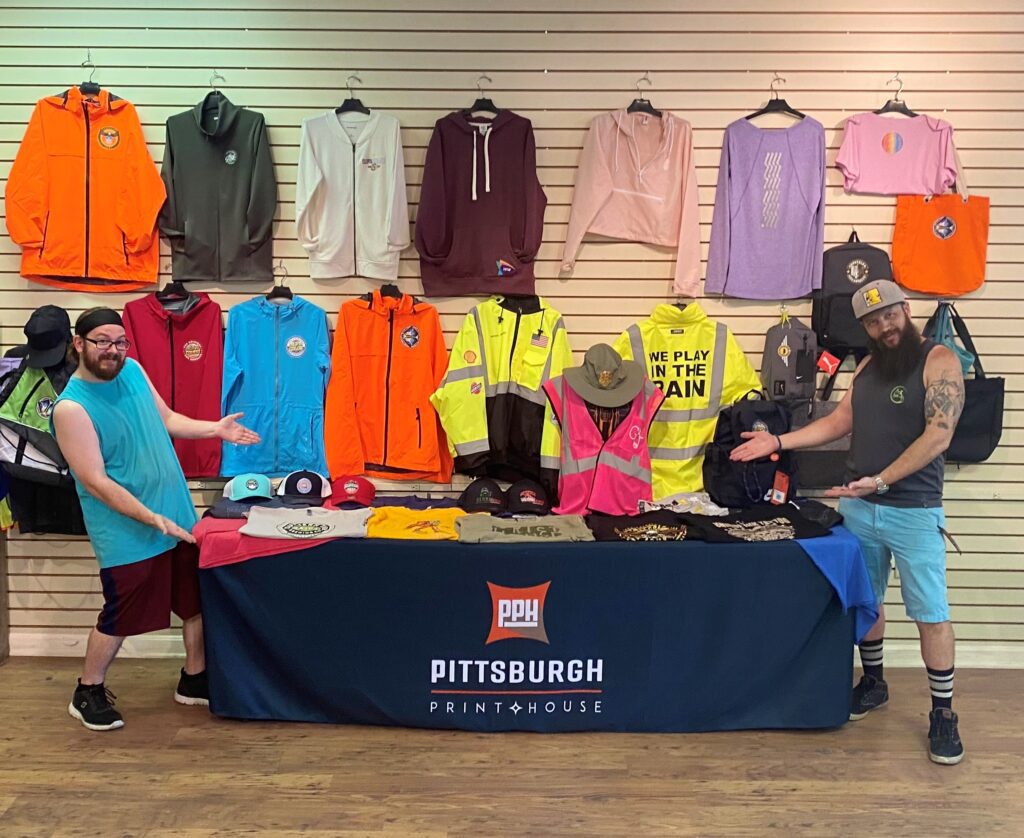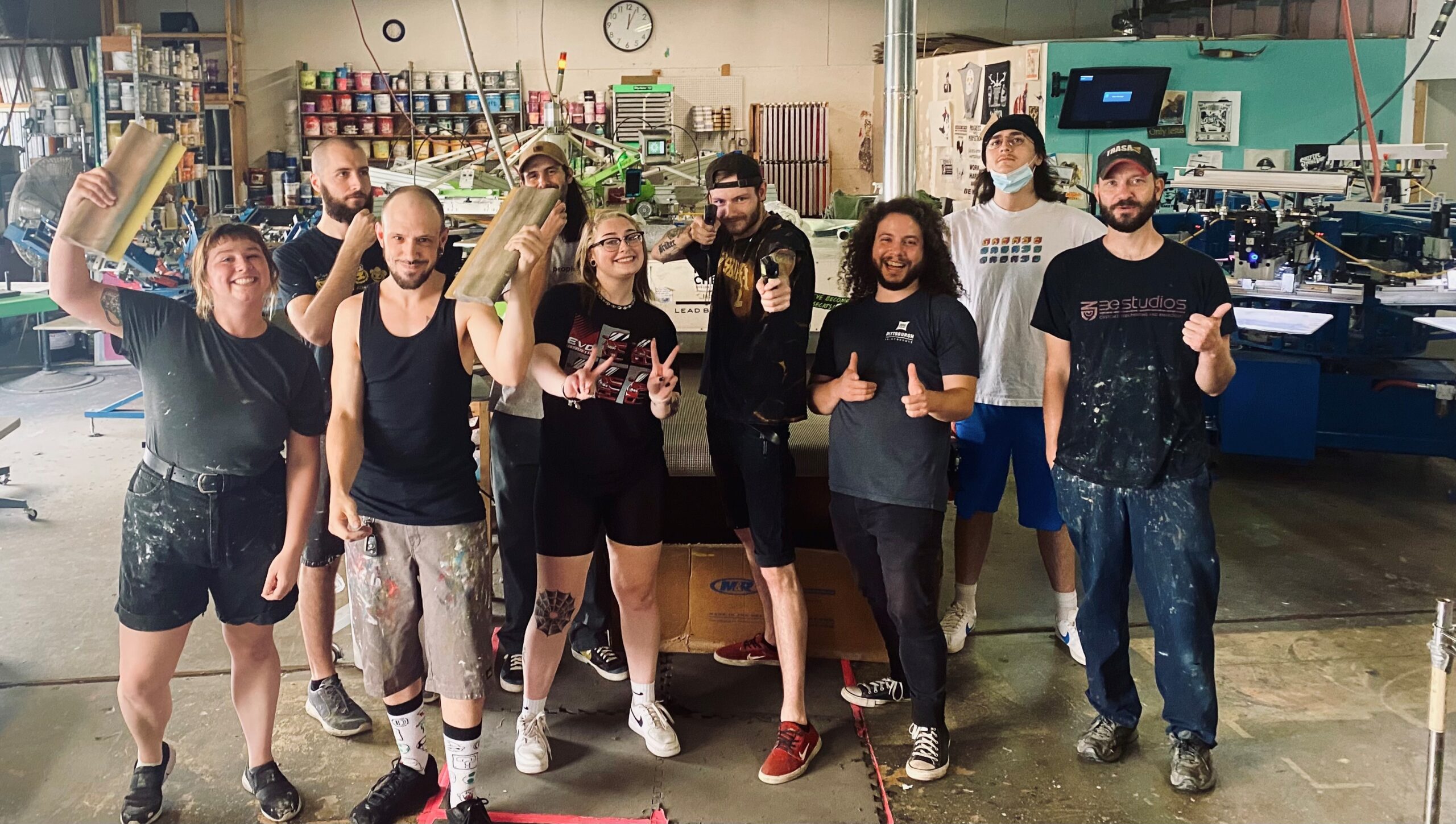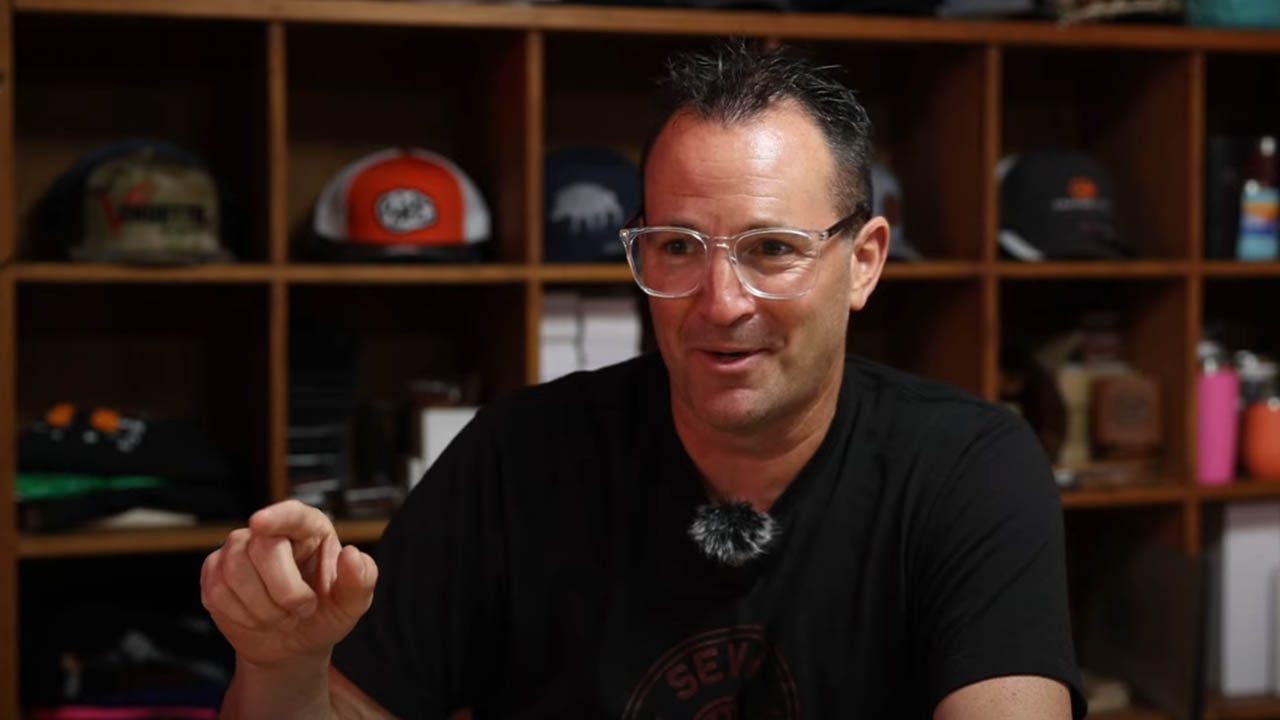Sometimes, some of the most difficult periods of a person’s life can create opportunities down the road, and for Pittsburgh Print House owner Jake Huffmyer, that’s exactly what happened.
While away at college in Florida, Huffmyer received news that his father had passed away. Unaware of what the future would hold for Huffmyer at that point, it was a connection with his cousin David Burns at his father’s funeral that would eventually unlock that answer.
After being left the house, Burns moved in with Huffmyer and as they say, the rest was history.
“I came back home from college with an audio engineering degree a little confused,” Huffmyer said. “Dave and I got together and created 3E Studios and the idea was that we were going to make our own little merch and record label. That was the start of it.”
Selling Merchandise
Huffmyer’s introduction into the world of custom decorating came in his early days as a musician in a band. With aspirations of making records, his plan was to pay for his records with merchandise sales.
“Where I first got to see screen printing was making my own merch for my band and playing music and being out on the road,” Huffmyer said. “It was kind of how I was making a living.”
To makes things easier on himself and his band, however, Huffmyer set off to Full Sail in Florida to pursue a degree in audio engineering. That would make his band self-sufficient and able to record their own records.
However, everything changed after the passing of his father and his newfound relationship with his cousin David. Huffmyer decided to change course slightly and instead of just pursuing music, he and his cousin would found a business, 3E Studios, where they would make merch and serve as a record label.
Little did they know at the time would it would eventually turn into.
Working out of his Basement
“It was kind of unclear what we were going to turn it into,” Huffmyer said. “I built a mini little studio in the basement and we had one of those old Pittsburgh showers where we created a rinse room for making screens.”
Luckily for Huffmyer, Burns already had the screen printing equipment sitting in storage. He was a student at the Art Institute and was interested in screen printing, but had nowhere to set it up.
Huffmyer’s basement fixed that problem.
“He and another buddy bought this screen printing equipment and had it in storage,” Huffmyer said. “They couldn’t find anywhere big enough to actually set the gear up. Through all my misfortunes at that time, I ended up having a big basement that was perfect for a screen print and recording studio shop.”
For the first couple of years, Huffmyer and Burnes printed out of his basement before upgrading – in a sense – to Mr. Smalls Recording Studio in downtown Pittsburgh.
Making the move was an upgrade in the sense that it got their business in front of more eyeballs and opened up more doors and opportunities to secure jobs. But it wasn’t an upgrade in size. Huffmyer and Burnes downgraded from roughly 1,000 square feet to 850, but it was a tradeoff well worth it.
Landing A Big Client
They wasted little to no time in securing a big client, Rusted Root, a rock band based out of Pittsburgh. Huffmyer and Burnes did all of the merch for Rusted Root, which in those days was a huge deal.
“It was basically a 2.0 from the basement,” Huffmyer said. “We went from a recording studio, merch set up in the basement, t to an actual recording studio in the city. We took the second floor and made that the print shop and I was recording out of the first-floor recording studio.
“Through that one of the owners from Mr. Smalls was Liz Burlin from Rusted Root. So Rusted Root’s tour merch was one of the first big accounts that we had. Weekly or monthly we were printing merch for those guys and that kind of broke us into the band merch market.”
Things were much simpler back in those days, Huffmyer said.
“That was probably one of the more special times in the history when I go back and look at it,” Huffmyer said. “It was early on where I was still naive and ambitious and loving what I was doing. I was still playing music, I was recording and I was doing merch.
“I’ve really shifted into more of like business owner mindset these last few years. I’m a property owner now, so some of those things that were a little more like fun, all of that is gone. I don’t have any of that on a day-to-day now.”
Upgrading Again
In 2012, they moved their production into a bigger space. They upgraded into a 1,500 square foot facility which has now turned into 5,000 square feet. They’ve used that same space for the past eight-plus years located just down the street from Heinze Field, the home of the Pittsburgh Steelers.
But for the first few years of 3E Studio’s existence, Huffmyer was mainly on the sidelines. He went back to college to pursue an electrical engineering degree. He later took a job in the electrical engineering field and would make trips to the print shop when he could to help.
“Dave actually took the leap into running the business full-time before I did,” Huffmyer said. “He was an art student and it kind of made a little more sense for him. I was kind of still going down that engineering path. I would come in in the evenings. Dave would be doing the day-to-day and I would come in and give my two cents on where we thought the company should go. We did that for a number of years while I was in school.”
Going All-In
After a while of doing that, it came a time in which Huffmyer needed to make a decision on whether he was going to pursue the business full-time or not.
“We kind of needed to make that decision to jump from this being a hobby to this becoming a legit business,” Huffmyer said. “That was in the 2013 range. That’s when I decided that I was going to give this a shot. So I left the engineering world full-time and joined the company full-time in 2013.”
Huffmyer had to take a pay cut to pursue his goal of becoming a full-time business owner. But it was a decision that proved to be the right one for both his and Burns’s future.
“That’s when we automated,” Huffmyer said. “We bought an automatic press and sort of divided the duties up between Dave and me. He ran sales, art, and marketing and I ran production. The goal there was to make this an efficient print company and Dave would go out and market promo products and things as well.”
More Big Decisions To Make
A couple of years later, the duo reached another roadblock.
“What we realized in our area of Pittsburgh was, and I know this is something that happens in our market a lot, but I think in particular in Pittsburgh where there is a little bit of paranoia with distributors, end-users, and ASI guys going directly to a contract guy vs going directly to a screen printer that has a sales department,” Huffmyer said. “We were seeing that very clearly. As I was starting to pick up contract work running production and Dave was selling directly to end-users, we were starting to notice this conflict, particularly on the contract side, where people were feeling hesitant to allow their client list to be visible to a company that also had a sales department.
So starting in 2015, the two decided to run two sets of Quickbooks with each of them focusing on their preferred side of the business to see if they could make it work as two independent companies.
“DecoNetwork helped out quite a bit because I actually made Dave’s sales company now, Armory Print Works, a customer in DecoNetwork, and I tracked all of their custom sales vs all of my contract sales. We were able to spit those out into QuickBooks very easily as two separate companies and we could see how profitable each company was and see if it could stand on its own.”
It Worked!
Lo and behold, their vision worked to perfection, but it didn’t make it any easier to end their test phase and make it a full-blown reality.
“It was a hard arriving at the decision to pull the trigger I think for both of us,” Huffmyer said. “We knew that it was the end of an era, you know? It was like a baby, It was like it graduated and went to college and now it’s an adult. It got to a place where there was a pretty big flaw and it was going to plateau a little bit. And unless we did something more drastic like this, it kind of was what it was and I think we both wanted a little more.”
Making The Split
At the beginning of 2019, Huffmyer and Burns split their company into two.
“Dave peeled off and became an ASI distributor with all promo products, and I became, exclusively, a contract decorator and we rebranded as the Pittsburgh Print House,” Huffmyer said. “This was very strategic for us,” Huffmyer said. “This partnership still exists. We took 50 percent of the company, employees, equipment and everything and made it the Pittsburgh Print House, which is a contract decorator. And we took the other half of the employees and created a brand new office space and made a new company named Armory Printworks. They are my biggest customer right now.”

Since the split, both Huffmyer and Burnes have found great success. Huffmyer purchased a 30,000 square foot warehouse in 2019 for the Pittsburgh Print House and is getting very close to moving in. Huffmyer said COVID-19 put a damper on construction plans, but they are expected to be fully moved in by the end of 2021.
“Now we’re kind of in a similar boat where we’re taking that next step,” Huffmyer said. “We’re trying to build a warehouse, automate more of our process and bring in other decoration methods and things. It’s now just a bigger machine that we’re dealing with.”
DecoNetwork Serves A Big Purpose
Through all of the peaks and valleys Huffmyer and Burns have been through since originally starting 3E Studios in 2007, they have been clients of DecoNetwork since 2014.
Huffmyer said that DecoNetwork has helped their business, both the Pittsburgh Print House, and 3E Studios in many ways and he has appreciated the innovation it has brought over the years.
“I started developing standards and things and realized that we needed some method and some means for communicating sales information to production,” Huffmyer said. “We looked at several in the beginning. DecoNetwork just seemed to have everything we were looking for.”
Custom coding has been a key fixture in Huffmyer’s usage of DecoNetwork since 2014. Allowing custom coding has helped Huffmyer set up the software and use it exactly how he wants and he’s applauded all of the tweaks and improvements to the software.
Always Improving
“(DecoNetwork) has come a long way with developing fixes for things and adding new features and allowing for custom coding,” Huffmyer said. “I remember back in the day that was something I appreciated about DecoNetwork. If you wanted to go deeper with the software, you could. It’s still one of my favorite things about how DecoNetwork has designed this tool.”
DecoNetwork has prided itself on being the best when it comes to the technology behind the software and Huffmyer has taken notice, he said.
“I just feel like DecoNetwork has always been a leader in the technology side of it which is what I think you need to be as a software developer,” Huffmyer said. “DecoNetwork listens to feedback. I can tell because, in their revisions that come out, you point out a big bug that got fixed. We heard you guys and here is the new tool. As a user, that’s huge to me that you can tell that you’re listening to the community of users that are out there and you’re responding fast to this everchanging market and you’re trying to make it easier for us to sell more business.”
While it has been a very winding road for Huffmyer over the past decade, he said he’s very excited about what the future holds with the Pittsburgh Print House. For more info on the Pittsburgh Print House, click HERE.




